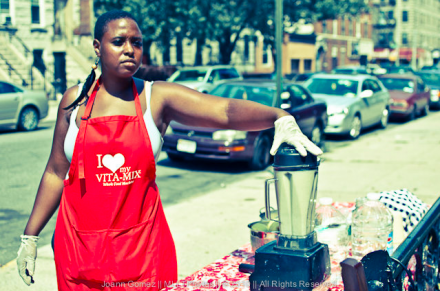Some of the traits we always look for in a good food job seeker are resilience and the ability to be proactive. In fact, the two often seem to go hand in hand, and they jumped off the page when we interviewed Melissa. We love how she saw an opportunity and made it happen -not just for herself, but for her community. That's what it's all about.
When did you know that you wanted to work in food?
I didn't have an "aha" moment so much as I had a series of WTF moments around perceptions of food and agriculture, food access, and how certain communities participate in good food models. There are no single issues when it comes to food and it was becoming difficult to promote seasonal, local eating as a Health Coach (my main hustle) without acknowledging and addressing those intersections.
How did you get your current good food job?
I created my good food job. I wanted to move beyond the farmers market and CSA model, so when Wholeshare presented itself, I took the opportunity to try it out. I first heard about Wholeshare at a food + tech connect show and tell meetup. Then I saw them a year and a half later at the NOFA-NY Winter Conference. I've been running Bed-Stuy Bounty for almost a year now, and my members get almost weekly deliveries of fresh and frozen produce, pastured meat, dairy, and eggs, pantry staples and more from Regional Access, Hudson Valley Harvest, Tierra Farm, and others at wholesale prices. Wholeshare.com's model is a great tool for building community around food without many of the logistical headaches that can affect the long-term viability of community food projects. Up until recently I was the only NYC group (the rest are scattered throughout New York State), but new groups have been forming in Queens, Manhattan, and The Bronx. I'm also helping people start their own groups.
How did your previous work or life experience prepare you for a good food job?
I have over 20 years of community service and organizing behind me. My mother was very active in the community, maintaining several ongoing projects throughout my childhood that I accompanied (read: was dragged to) her to through her employer's community service organization, holding various positions in our block association, serving as a board member of a daycare center organization. So that, along with a string of customer service jobs, working as a Just Food Community Chef and co-managing Bed-Stuy Farm Share uniquely positioned me to understand how to meet people where they are, create buy-in, and communicate value.
What was the greatest obstacle you had to overcome in pursuing your Good Food Job dream?
Normative whiteness and this idea that what we're all doing is new. It can be extremely frustrating and exhausting to work with, through, and around. It's difficult for some white people working in the good food movement to acknowledge that they have a racialized consciousness and the role their white privilege pays in how they participate and benefit from the work, especially when working in communities of color. Some would like to believe that race isn't an issue, but when you look at who's getting the funding, who holds leadership positions on the organizational level, who's being hired to do the on-ground work, who's getting the recognition/media attention, and how nonwhite people are presented (often as recipients, in need, rarely as co/creators, rarely empowered) it's pretty obvious.
Instead of quitting, I just looked for new ways to participate that have value and meaning for me. I persevere because it's important people in my community see someone who looks like them doing this work. It's important from a historical, sociocultural and economic perspective that people of African Descent in the US heal their relationship with the land, farming, and food. The legacy of slavery has black people feeling a certain kind of way about farming because it's never been presented to them as dignified, life-affirming and able to earn folks a good living, but my friends and I understand that the only way to transcend and heal from that is to reclaim food and farming in a way that speaks to our cultural and ancestral heritage. All of our contemporary US agricultural practices are founded in slavery. I have taken the responsibility to remind folks that black people have significantly contributed to agriculture in this country through their insight, innovation, and invention. We tend to only look at the atrocity that is slavery, but that does a disservice to folks like George Washington Carver, Dr. Booker T. Whatley, and the 1890 land grant universities who worked to improve the economic conditions of farmers in the South, pioneered the establishment of the cooperative extension, and advocated for what we now call organic farming practices.
What can you identify as the greatest opportunities in food right now?
I see the good food movement as an opportunity for people to become more economically self-sufficient. Conspicuous consumerism made it okay for us to forget how to provide for our basic needs (food, shelter, clothing) and we need to return to some of that, no matter how small our participation. I see this movement as an opportunity for us to heal from the dis-ease that consumerism has created. Whether you grow or raise your own food to feed yourself or to generate additional income, the fact is, everybody eats. See what's missing, what gaps you can fill and build something off of it.
If you could be compensated for your work with something other than money, what would it be?
Food, but I already get compensated with food for my work in addition to money. The extra benefit of doing what I do.









